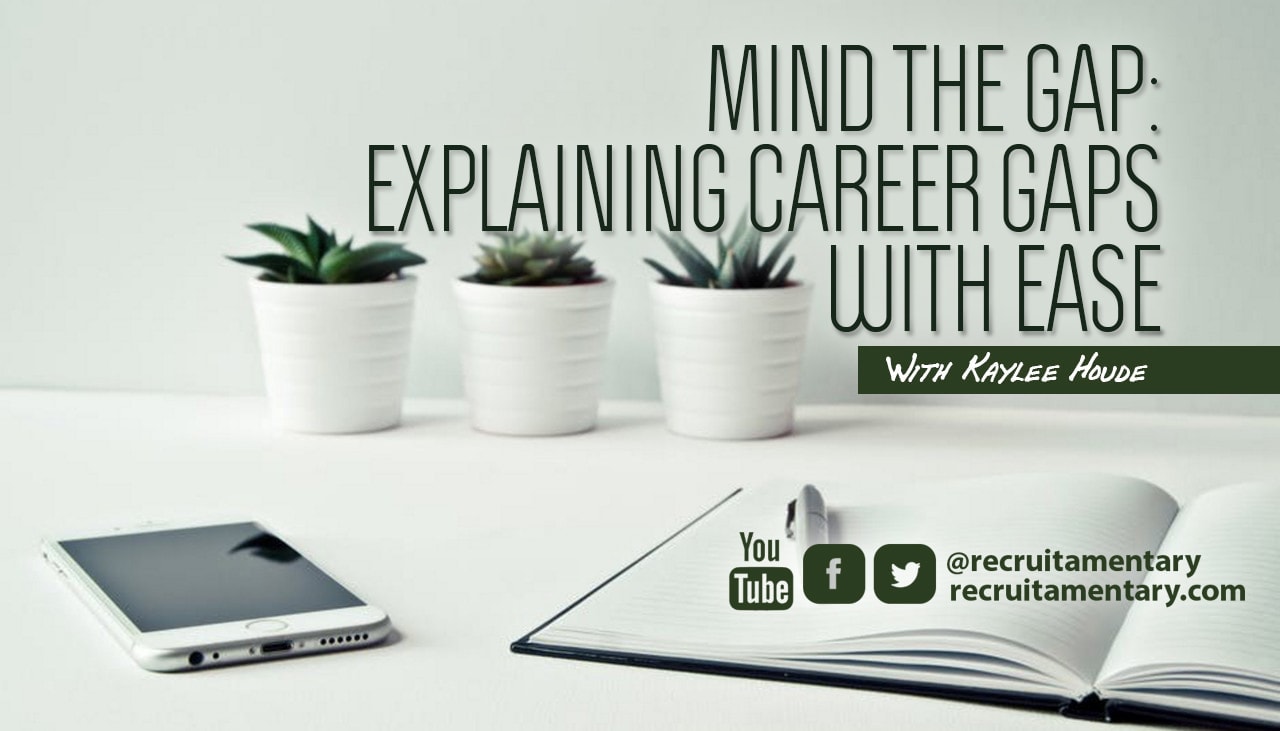Mind The Gap: Explaining Career Gaps with Ease

“Tell me about this gap on your resume…”
It is the dreaded question that you know the recruiter is going to ask you. You have no idea what to say. Perhaps you were on your parents’ couch surfing the web and looking for employment for three years because of an economic downturn. That definitely does not sound good, does it? It is true though, isn’t it? What do I say!?
“You can paint an honest picture of yourself without making the entirety of your personal life a near-stranger’s business” – Stacey Lastoe
The Truth About Gaps
You are not alone. A lot of people have career gaps for a variety of reasons: economic downturns, taking care of elderly parents, childcare purposes, simply traveling the world, and more…
Thus, hiring managers and recruiters are used to seeing resumes with gaps. They will do their due diligence, however, and ask you about it, so how do you plan to be prepared?
Addressing and Articulating
The trick to managing the gap, is being honest and authentic while still keeping the hiring manager’s perspective in mind. It is a balance.
Help them understand that there is nothing to worry about. There are a few things you can start with to help the reader or interviewer understand your point of view:
- Explain the gap in your resume or cover letter simply and optimistically, less is more
- Tell the story about what you were doing, and what you learned during the so-called gap as a result
- Articulate your commitment and excitement about the new opportunity in front of you
Explaining it away
Justifying in a sentence or two why you were in Florida for three years taking care of your elderly parents is easier than you may think. They needed your help, and it shows your commitment to doing what needs to be done.
Unless you have simply sat on the couch and watched re-runs of Seinfeld for those gap years, you probably have something to say about the time you have taken for yourself.
Perhaps you were laid off during a downturn and decided to travel the world with your wife. You became more cultured before returning to your homelands to start again.
Whatever it is that you did – volunteering, working at the corner store with Joe, handing out coupons at Walmart, or ghost writing articles on the Internet – you had 7 days a week to do SOMETHING. So, tell the hiring manager or recruiter what you did, and why.
You can apply the accomplishment statement format to this, even.
“Volunteered at XYZ Corp supporting intake at the shelter and advising on policies while collaborating with security personnel, resulting in a safer and more productive environment for X# of homeless families” (For example)
What did you learn?
If you sit in the waiting room worrying about whether or not they are going to ask you about your employment gap, the chances are 99.9% of the time they are. Be prepared to answer. Instead of worrying about whether or not you might have to justify yourself, be prepared by spending some time thinking through what you learned during your gap year(s).
Perhaps you learned a thing or two about resiliency during this time. You likely had to maintain a positive mindset despite countless rejection e-mails. Perhaps you learned that you love customer service from your volunteer experiences and want to bring that new-found passion to the role you are applying to.
There is always a silver lining. By the time you make it to the interview, you have got to find it.
What did you learn during those years? How does that add value to your character? We are human beings, and your interviewer knows this. Nobody expects you to be perfect, but they do expect you to do your homework and show up the best you are able.
Articulate your commitment
Similar to the “overqualified” conversation we had last week, do not forget to articulate your commitment to the role. This can be done in a few ways, as outlined below.
When you write your cover letter, if you do address the employment gap, once again articulate how this led you to XYZ company. This is your chance to link it back to the reader, and how it adds value to them. Do not leave the reader hanging. Walk them through your thought process on how this authentic part of the story is pertinent.
When you are in the interview and given the opportunity to explain your employment gap, wrap it up on a positive note by re-emphasizing how these new learnings overlap with your passion for the company’s vision, role, team, policy, project, etc.
At the end of the interview, and in your follow up e-mail, do it again. I am excited to hear back from you because…
“The volunteer work I have been doing for the past year and a half has prepared me to blow your customers away with my new-found customer service skills”
“Taking care of my elderly parents for three years has prepared me to handle schedule changes and emergency situations with ease.”
“Touring Japan on a bicycle has prepared me to stay strong and never give up, even when it is pouring rain and the world seems to be turning against me. I hope to bring this new-found resiliency to your XYZ role.”
These are just a few examples of how you might be able to authentically emphasize your commitment level despite an employment gap. While you think that it may be obvious to the recruiter and hiring manager that you are excited and want the job, the clearer you make it for them the more confident they will be that they are making the right choice in extending you the offer.

Follow Kaylee on social media!


